

CHARLES-CAMILLE SAINT-SAËNS - (1835-1921) A French Romantic Era composer. His The Carnival of the Animals was written as a musical joke, and Saint-Saëns believed it would harm his reputation as a serious composer. Instead, this work has provided a testament to the imagination and musical brilliance of Camille Saint-Saëns. Read more...

ERIK SATIE - (1866-1925) A French composer and pianist. Satie was considered a colorful figure in the Parisian avant-garde of the early 20th century. With the support of Maurice Ravel and Claude Debussy, Satie became an established and respected composer.
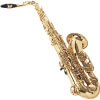
SAXOPHONE - A member of the woodwind family. It is made of brass with a single reed. The saxophone is named after its inventor, Adolphe Sax.

SCALE - Musical notes that ascend or descend in specific half and whole step patterns. The most common scales include the major, minor, chromatic and whole tone scales.

SCHERZO - A fast-moving, humorous composition. The third movement in a four-movement work, such as a symphony, is often a scherzo.

SCORE - A music manuscript which includes the parts for each instrument of the ensemble in standard instrumental family order.

SECTION - A distinct part within a musical composition.

SEGNO - "Sign."
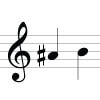
SEMITONE - A half step. The smallest interval on the piano keyboard.

SEMPRE - Always.

SEMPLICE - Simple.

SENZA - Without.

SEQUENCE - The repetition of a motive at a higher or lower pitch.

SEVENTH CHORD - A chord consisting of a triad and a note the interval of a seventh above the root of the chord.
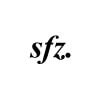
SFORZANDO - Sudden, and strongly accented.

SHARP - A musical symbol that raises a note by one half step. Opposite of "Flat".
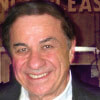
RICHARD SHERMAN - (1928-Present) An American songwriter and music director. Together with his brother, Robert, Richard wrote some of the best loved Disney songs, including songs from Mary Poppins, The Jungle Book, Winnie the Pooh, and It's a Small World.

DIMITRI SHOSTAKOVICH - (1906-1975) Russian Modern Era composer. Many people feel that Shostakovich was one of the greatest composers of the mid-twentieth century. Read more...
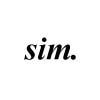
SIMILE - In the same style.

FRANK SINATRA - (1915-1998) An American singer and actor. Sinatra is one of the best-selling recording artists of all time. He is the recipient of eleven Grammy Awards, and was honored at the Kennedy Center Honors in 1983. He is remembered for his songs, It Was A Very Good Year and Fly Me to the Moon, and the film Guys and Dolls (1955).
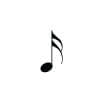
SIXTEENTH NOTE - A note played for one sixteenth of the length of a whole note. For example, in 4/4 meter a sixteenth note receives one quarter beat of sound.
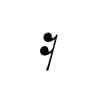
SIXTEENTH REST - A rest played for one sixteenth of the length of a whole rest. For example, in 4/4 meter a sixteenth note receives one quarter beat of silence.
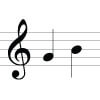

SLUR - A curved line above or below notes that are changing pitch, indicating that the music is to be performed in legato style.
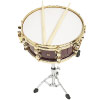
SNARE DRUM - A non-pitched instrument that serves an important part in the symphony orchestra, both as a supporting instrument and sometimes a solo instrument. The snare drum's characteristic "buzz" sets it apart from the other instruments of the orchestra.

SOL - The solfége syllable for the fifth note of the major scale.

SOLFÉGE - A method used to teach sight singing.

SOLO - To play or sing alone, or with accompaniment.

SOLOIST - A featured performer. Often accompanied by a piano or symphony orchestra.

SONATA - Played. A piece of music for instruments, rather that singers.

SONATINA - A short sonata.

SOPRANO - The highest female voice in choral music. Also, the highest sounding instrument in a family, such as the Soprano Clarinet from the woodwind family.

SPICCATO - A string instrument bowing technique where the bow is bounced on the string.
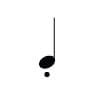
STACCATO - A musical symbol indicating short, detached sounds.
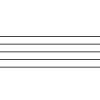
STAFF - A set of five lines and four spaces on which music is written.
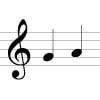
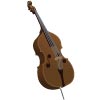
STRING BASS - The string bass is the largest member of the string family. It is also known as the double bass, contrabass, upright bass, bull fiddle, bass fiddle, bass violin, or just bass. In our modern orchestra it is common to see eight string basses. It plays notes an octave lower than the cello.

STRINGS - The family of instruments that produce sound by causing strings to vibrate. String instruments in the symphony orchestra include the violin, viola, cello, string bass.

SUBITO - Suddenly.

SUSTAIN PEDAL - The piano pedal that lifts the dampers off the strings. Also called the "Damper Pedal".

SYMPHONY - An orchestra, or a composition for a large orchestra in sonata form.

SYNCOPATION - A shift from the normal accents, placing emphasis on the weak beats within a measure instead.